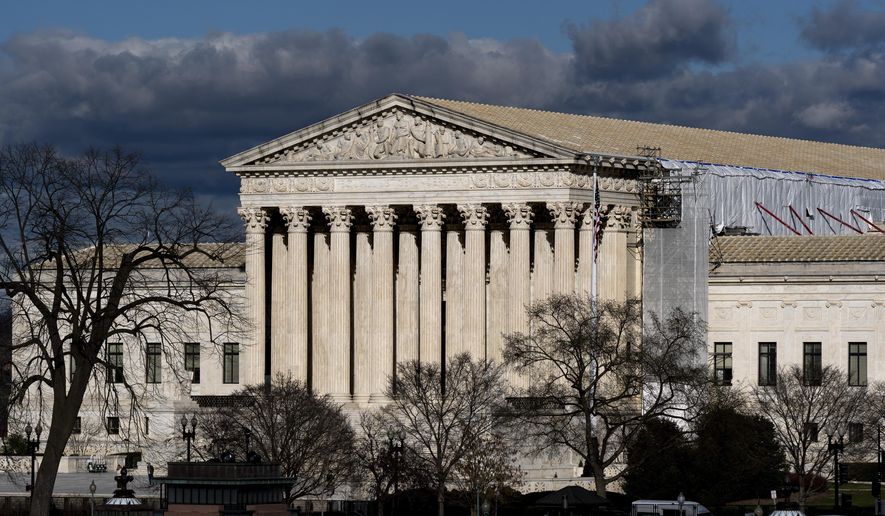The Supreme Court battled Tuesday over marriage rights and whether a couple’s desire to live together can trump the government’s decision to block gang members and other dangerous persons from immigrating to the U.S.
The case involves Sandra Munoz, a U.S. citizen who is trying to get her husband, a citizen of El Salvador, into the U.S. to live with her. The State Department denied him a visa because it suspected he had ties to the violent MS-13 gang.
Ms. Munoz says the government is not only wrong about her husband but the decision is unfairly hindering her right to live with the person to whom she is married.
“This is a case about the importance of marriage,” Eric T. Lee, Ms. Munoz’s lawyer, told the court.
Ms. Munoz’s husband is Luis Ascencio-Cordero, an illegal immigrant who came to the U.S. in 2005. The couple married in 2010, and Mr. Ascencio-Cordero then applied to adjust his status to that of a lawful permanent resident. The government approved that and Mr. Ascencio-Cordero went back to El Salvador to complete the process at a U.S. consulate in 2015.
But the State Department then denied his visa, arguing Mr. Ascencio-Cordero was likely to be a criminal if he came back. Ms. Munoz sued and the government eventually revealed the consular officer believed Mr. Ascencio-Cordero’s four tattoos meant he was part of MS-13.
Normally, that would be the end of it, but Ms. Munoz argues that as a U.S. citizen, she has a right to live with her spouse. She said that right is at least strong enough to demand that the government give her a better explanation and a fair chance to argue he isn’t a member of MS-13.
Justice Sonia Sotomayor was somewhat sympathetic, ticking off a long line of cases heralding marriage rights, from the Loving decision that struck down miscegenation laws to the Windsor decision that struck down the federal Defense Against Marriage Act.
“As I see the question, she has a liberty interest in her marriage and having her husband visit. She doesn’t have a liberty interest in seeing the visa granted,” Justice Sotomayor said.
She said that could mean Ms. Munoz is entitled to a “limited” review, including a little bit of information about the denial.
Several justices pointed out that Ms. Munoz already got that with the initial denial and got much more when the government specified it was worried about the tattoos and MS-13.
Ms. Munoz’s lawyer said that information came too late for the couple to ask for a do-over at the State Department.
Should Ms. Munoz prevail, it could open the avenue for thousands of court challenges to visa denials.
Deputy Solicitor General Curtis E. Gannon said the State Department approved 11 million visas last year and denied 62,000 applications, including 5,400 noncitizens who were seeking to reunite here with U.S. citizen partners.
He said Congress has generally shielded consular decisions from court review and he urged the justices not to create an exception for Ms. Munoz, who isn’t even the person with the immigration petition. He said if Mr. Ascencio-Cordero can’t challenge the State Department, Ms. Munoz also can’t.
Mr. Gannon pointed to the situation where someone already in the U.S. is being deported and said no spouses can step in to challenge that in court by arguing they have a marriage liberty interest in keeping their partner here despite violations of the law.
“The point here is that being able to live with your spouse in the United States is not the same thing as being able to get your spouse admitted,” he said.
Chief Justice John G. Roberts Jr. suggested the justices could struggle with sorting those two issues out.
“How would you go about weighing the interest in marriage with the interest in national security? That’s like apples and giraffes,” he said.
The justices kept coming back to a 1972 case, the Mandel decision, where the court ruled Americans have a First Amendment right to be able to meet with a Belgian left-wing journalist, in person. That right gives them the power to question a visa denial, but the government prevails as long as it demonstrates it had a bona fide reason for the denial.
Several justices wondered whether Ms. Munoz could circumvent the marriage issue by claiming a First Amendment right to hear from Mr. Ascencio-Cordero and to force the visa issue that way.
• Stephen Dinan can be reached at sdinan@washingtontimes.com.




Please read our comment policy before commenting.